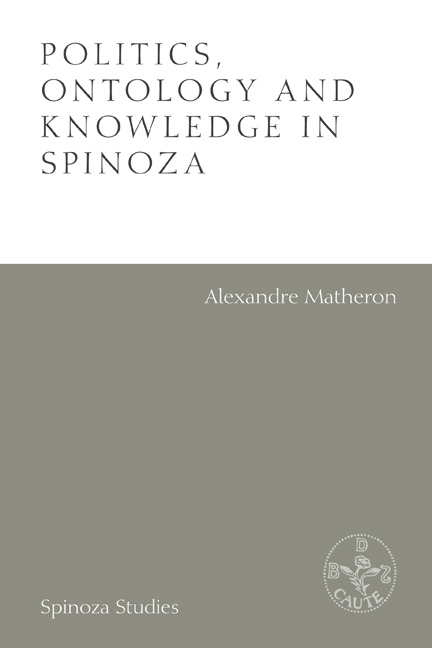Book contents
- Frontmatter
- Contents
- Abbreviations
- Notes on Translation and Acknowledgements
- A Revolutionary Beatitude: Alexandre Matheron’s Spinozism
- I Spinoza on Ontology and Knowledge
- 1 Idea, Idea of the Idea and Certainty in the Tractatus de Intellectus Emendatione and the Ethics
- 2 Essence, Existence and Power in Part I of the Ethics: The Foundations of Proposition 16
- 3 Physics and Ontology in Spinoza: The Enigmatic Response to Tschirnhaus
- 4 The Year 1663 and the Spinozist Identity of Being and Power: Hypothesis on a Development
- 5 Eternal Life and the Body According to Spinoza
- 6 Intellectual Love of God, Eternal Part of the amor erga Deum
- II Spinoza on Politics and Ethics
- 7 State and Morality According to Spinoza
- 8 Ethics and Politics in Spinoza (Remarks on the Role of Ethics IV, 37 Scholium 2)
- 9 Indignation and the Conatus of the Spinozist State
- 10 Passions and Institutions According to Spinoza
- 11 The Problem of Spinoza's Evolution: From the Theologico-Political Treatise to the Political Treatise
- 12 Is the State, According to Spinoza, an Individual in Spinoza’s Sense?
- 13 The Ontological Status of Scripture and the Spinozist Doctrine of Individuality
- 14 Spinoza and Power
- 15 Spinoza and Property
- 16 Spinoza and Sexuality
- 17 Women and Servants in Spinozist Democracy
- 18 The ‘Right of the Stronger’: Hobbes contra Spinoza
- 19 The Theoretical Function of Democracy in Spinoza and Hobbes
- 20 Spinoza and the Breakdown of Thomist Politics: Machiavellianism and Utopia
- Appendix 1 Interview with Laurent Bove and Pierre-François Moreau
- Appendix 2 Chronology of Works by Matheron
- Works Cited
- Index
10 - Passions and Institutions According to Spinoza
Published online by Cambridge University Press: 03 October 2020
- Frontmatter
- Contents
- Abbreviations
- Notes on Translation and Acknowledgements
- A Revolutionary Beatitude: Alexandre Matheron’s Spinozism
- I Spinoza on Ontology and Knowledge
- 1 Idea, Idea of the Idea and Certainty in the Tractatus de Intellectus Emendatione and the Ethics
- 2 Essence, Existence and Power in Part I of the Ethics: The Foundations of Proposition 16
- 3 Physics and Ontology in Spinoza: The Enigmatic Response to Tschirnhaus
- 4 The Year 1663 and the Spinozist Identity of Being and Power: Hypothesis on a Development
- 5 Eternal Life and the Body According to Spinoza
- 6 Intellectual Love of God, Eternal Part of the amor erga Deum
- II Spinoza on Politics and Ethics
- 7 State and Morality According to Spinoza
- 8 Ethics and Politics in Spinoza (Remarks on the Role of Ethics IV, 37 Scholium 2)
- 9 Indignation and the Conatus of the Spinozist State
- 10 Passions and Institutions According to Spinoza
- 11 The Problem of Spinoza's Evolution: From the Theologico-Political Treatise to the Political Treatise
- 12 Is the State, According to Spinoza, an Individual in Spinoza’s Sense?
- 13 The Ontological Status of Scripture and the Spinozist Doctrine of Individuality
- 14 Spinoza and Power
- 15 Spinoza and Property
- 16 Spinoza and Sexuality
- 17 Women and Servants in Spinozist Democracy
- 18 The ‘Right of the Stronger’: Hobbes contra Spinoza
- 19 The Theoretical Function of Democracy in Spinoza and Hobbes
- 20 Spinoza and the Breakdown of Thomist Politics: Machiavellianism and Utopia
- Appendix 1 Interview with Laurent Bove and Pierre-François Moreau
- Appendix 2 Chronology of Works by Matheron
- Works Cited
- Index
Summary
Spinoza's political doctrine is, in a sense, deduced entirely from his theory of passions, even though Spinoza himself did not always carry out this deduction explicitly. Indeed, we can show, first of all, that the Spinozist theory of passions allows us to account for what Spinoza calls ‘the causes and natural foundations’ of political society and the main types of institutions that it includes. We can show, second, that this theory of passions allows us to account for the way in which Spinoza conceives of the institutional dysfunctions that are at the origin of the self-destruction of the majority of actually existing political societies. And finally, we can show that it allows us to account for the way in which Spinoza conceives of the remedies to be given for these dysfunctions: these remedies consist in the establishment of perfectly self-regulating institutional systems. These are the three points that I wish to try to summarise here.
‘The Causes and Natural Foundations’ of Political Society
Spinoza tells us explicitly in Paragraph 7 of Chapter I of the Political Treatise that ‘the causes and natural foundations’ of the State must be deduced not from the teachings of reason, ‘but from the common nature, or condition, of men’ – that is to say, very clearly, from the nature or condition of human beings subjected to passions. But which passions exactly? On this point, we have three kinds of indications at our disposal.
A. Throughout the TP, Spinoza presupposes as self-evident that human beings desire necessarily to possess material goods (this is avaritia, a passion ‘that is universal and constant’) and that they are necessarily superstitious.
Now, on the one hand, the origin of the desire to possess material goods was explained perfectly in the first half of Part III of the Ethics, even independently of any reference to interhuman relations. We necessarily strive to persevere in our being. When this striving (conatus) is favoured by external causes, it becomes joy. When this joy is accompanied by the idea of an external cause that we attribute to it, it becomes love for this external cause: we attach ourselves to it unconditionally, we desire to appropriate it for ourselves at any cost and to preserve it, we alienate ourselves entirely to it.
- Type
- Chapter
- Information
- Politics, Ontology and Knowledge in Spinoza , pp. 136 - 162Publisher: Edinburgh University PressPrint publication year: 2020



